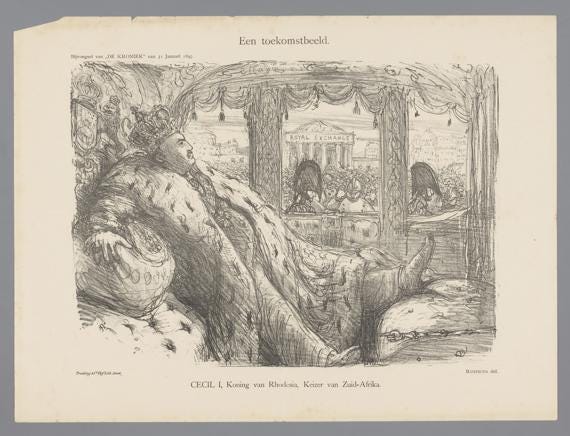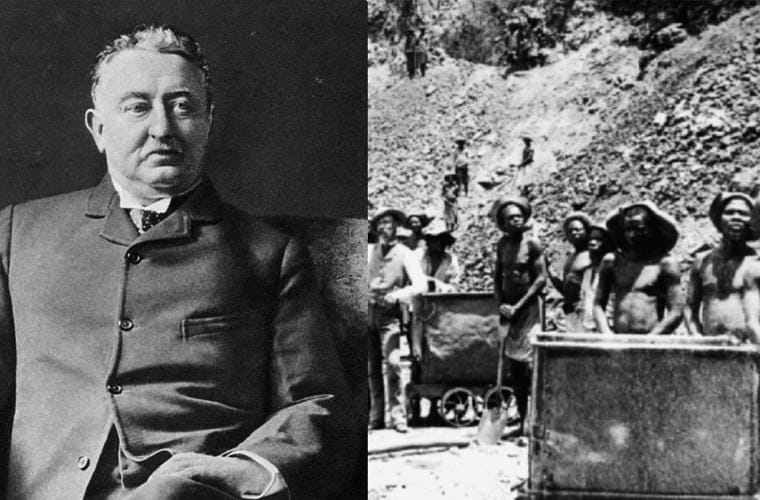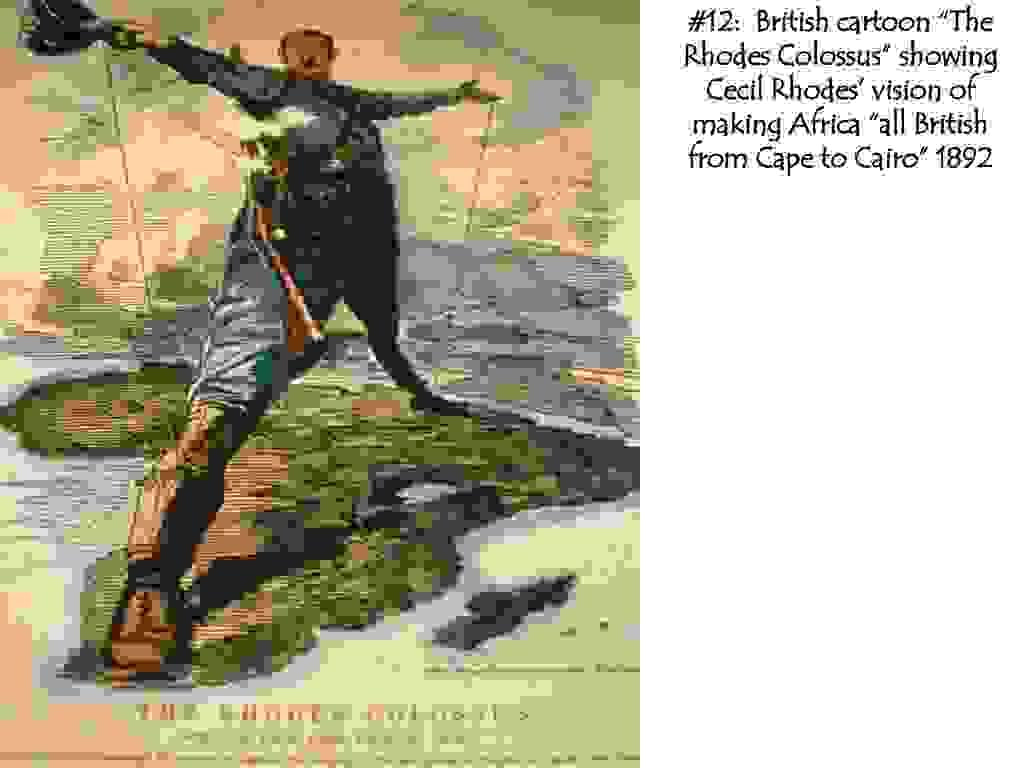
(I am reposting this article here on Substack as it is relevant to the ongoing conflict in the Middle East, though this will not be apparent unless you know more of the story than what I tell here. Suffice it to say that the Boer War in South Africa, instigated by Rhodes and his close colleague Alfred Milner and funded by Lord Rothschild, set the stage and, through British monopolization of South African diamond mines, provided funds for WWI and WWII to follow and, by the same token, for the dividing up of the map and the establishment of the British mandate of Palestine (later the State of Israel). Sir Arthur Balfour—of the Balfour Declaration—was a friend of Rhodes, Milner and Rothschild and played an integral part in all of this.
Though I am preparing to write an article focusing on Palestine, I provide the present article as a primer. I wrote it over two years ago when I was first investigating the Rhodes legacy, but neglected to finish or publish it. This was long before I’d read Tragedy and Hope 101, a short book by Joseph Plummer recommended to me by a friend, which I consider one of the most important books for understanding present day geopolitics and finance. The only thing Plummer glides over is the intricate involvement of the Rothschild family every step of the way.)
Update:
(Oct 26, 2024)
Having discovered this day an article showing the more positive side of this story of Cecil Rhodes, I feel compelled to warn the reader that the “Rhodes Must Fall” article I cite below presents what would apear to be an ahistorical, i.e. umbalanced and misleading, account that leaves the reader with a shallow and false impression of what Rhodes really stood for. My apologies. Please refer to this article by History Reclaimed for a more balanced account. I leave the citation as an example of poor, ideologiacally biased history, but I am deleting two other citations which I now see as untrusworthy. It is up to the reader to weigh these accounts and form their own analysis. Comments welcome!
Whatever the case may be, it is no exageration that Cecil Rhodes did have a vision for world domination, as explicitly expressed in his wills cited below, and that this vision was not unique to him but was held by prominent contemporaries in British society and led to, it must be said, subersive activities including the formation of the secret British Round Tables and what would become the Chatham House in the UK and Council on Foreign Relations in the US, alongside many other subversive British led globalist oranizations and projects.
A 2016 article entitled, Rhodes Must Fall: We Need To Face Up To Our Imperial Past, discusses a campaign for the removal of a statue of Cecil Rhodes at Oxford's Oriel College:
"There is no doubt that Cecil Rhodes was a ruthless colonial expansionist, an Anglo-Saxon supremacist and a virulent racist, even by the terms of the time. Born in 1853, Rhodes went to the Cape as an adolescent due to ill health, founded the de Beers diamond company and, as a diamond magnate, became one of the world’s richest men. He went into politics, was largely responsible for massacring and subjugating the Ndebele of what then became termed Rhodesia, and was partially discredited by his role in the Jameson Raid before dying at the age of 49 in 1902. He was fervently committed to British Imperialism, candidly writing:
“I contend that we are the first race in the world, and that the more of the world we inhabit the better it is for the human race. Just fancy those parts that are at present inhabited by the most despicable specimen of human being, what an alteration there would be in them if they were brought under Anglo-Saxon influence…if there be a God, I think that what he would like me to do is paint as much of the map of Africa British Red as possible…”
Above: Sponsored by Lord Rothschild, Cecil Rhodes set up the De Beers diamond company where he made his fortunes
The inner quote from “Rhodes Must Fall” (bold type) cites a June 2, 1877 paper written by Rhodes while at Oxford, entitled, "Confession of Faith", which can be found in full on a University of Oregon webpage. In this paper, Rhodes purpose appears to be the promotion of the idea of forming a secret society for the expansion of the British Empire and Anglo-Saxon dominance.
At the bottom of the same webpage you can also find the following:
On September 19, 1877, Rhodes drafted his first will; at that time, he had an estate of only about £10,000. (Although he changed his will quite a number of times in years following, the objective remained the same. After his death, the directors of the Rhodes Trust set up the Rhodes Scholarships as the best way to achieve his objectives.) The first clause of the 1877 will bequeathed his wealth as follows:
To and for the establishment, promotion and development of a Secret Society, the true aim and object whereof shall be for the extension of British rule throughout the world, the perfecting of a system of emigration from the United Kingdom, and of colonisation by British subjects of all lands where the means of livelihood are attainable by energy, labour and enterprise, and especially the occupation by British settlers of the entire Continent of Africa, the Holy Land, the Valley of the Euphrates, the Islands of Cyprus and Candia, the whole of South America, the Islands of the Pacific not heretofore possessed by Great Britain, the whole of the Malay Archipelago, the seaboard of China and Japan, the ultimate recovery of the United States of America as an integral part of the British Empire, the inauguration of a system of Colonial representation in the Imperial Parliament which may tend to weld together the disjointed members of the Empire and, finally, the foundation of so great a Power as to render wars impossible and promote the best interests of humanity.
‘THE NATIVES ARE A DISTINCT SOURCE OF TROUBLE AND LOSS TO THE COUNTRY…THEY SHOULD BE A SOURCE OF GREAT ASSISTANCE TO US. AT ANY RATE, IF THE WHITES MAINTAIN THEIR POSITION AS THE SUPREME RACE, THE DAY MAY COME WHEN WE SHALL ALL BE THANKFUL THAT WE HAVE THE NATIVES WITH US IN THEIR PROPER POSITION…TO FIND CERTAIN LOCATIONS FOR THEM WHERE, WITHOUT ANY RIGHT OR TITLE TO THE LAND, THEY ARE HERDED TOGETHER. THEY ARE MULTIPLYING AT ENORMOUS RATE WITHOUT THE OLD DIMINUTIONS OF WAR AND PESTILENCE TO CONTROL THEIR NUMBER. AND WE HAVE GIVEN THEM NO SHARE IN THE GOVERNMENT.’
—Rhodes inaugural speech as Prime Minister of the Cape Colonies, 13th November 1900
Below is the abstract of a research article in the Journal of Imperial and Commonwealth History (emphasis mine):
ABSTRACT
Cecil Rhodes (1853–1902) safeguarded his imperial vision with a series of wills. Sensing that his life would be relatively short, he left to his trustees the task of carrying out his wishes after his death. He also left a substantial fortune to make it possible. This article uses those wills to follow the development of Rhodes’ ‘big idea’, the creation of a secret society to promote imperial expansion, from its birth in Oxford to the final compromise of the Rhodes Scholarships. The article questions the existence of a much-quoted teenage will, examines the influences on Rhodes at Oxford that led to the famous ‘Confession of Faith’ will and identifies a link between the 1892 will and the Mandela Rhodes scholarships founded in 2003.
Irish American historian Carol Quigley (1910-1977), professor of the development of civilizations who taught at Princeton, then Harvard, and then from 1941 to 1976 at the School of Foreign Service at Georgetown University, and author of Tragedy and Hope and the Anglo American Establishment, believed that the Round Table (later Round Tables) was a front for just such a secret society beginning in 1891, dubbed the Society of the Elect:
What is not so widely known is that Rhodes in five previous wills left his fortune to form a secret society, which was to devote itself to the preservation and expansion of the British Empire. [...] this secret society was created by Rhodes and his principal trustee, Lord Milner, and continues to exist to this day [...] He aspired to be the creator of one of those vast semi-religious, quasi-political associations which, like the Society of Jesus [i.e. the Jesuits], have played so large a part in the history of the world.
--Carroll Quigley, The Anglo-American Establishment: From Rhodes to Cliveden
Persons named by Wikipedia (see its paragraph on conspiracy theories) refuting that the Round Table is or ever was such a group include: Ivison Macadam (1894-1974), long-time editor of the Round Table Journal; Alexander May, in The Round Table, 1910–66 (Oxford, 1995, pp. 16-17); and David P. Billington Jr in Tragedy and Hope: Carroll Quigley and the 'Rhodes Conspiracy in The American Oxonian, the magazine of the Association of American Rhodes Scholars (82/4 1994, p. 232). It might be noted that all three of these persons had associations and interests to protect.
Upon Rhodes death, Rhodes scholarships were established. According to Encyclopedia Britannica:
Rhodes scholarship, educational grant to the University of Oxford established in 1902 by the will of Cecil Rhodes for the purpose of promoting unity among English-speaking nations.
The scholarships can be seen as part of a broader program of bringing the United States, in particular, under the influence and control of British elites.
In conclusion, I agree with the conclusions of the writer of the first article I mentioned on the proposed removal of Rhodes' statue: it's important that we not forget our history. He says...
As an alternative solution, I rather like David Olusoga’s suggestion of putting up an additional plaque explaining Rhodes’s history, rather than knocking it down. It matters that people know who Rhodes was. We need a proper contextualisation of all the statues, memorials, street names, country houses that are steeped in this colonial history. So the questions the campaigners raise about syllabi and representation are crucial – they deal with the forgetting. Removing a statue is the easy bit. Far more difficult is a sustained interrogation of our colonial past.
But as Joseph Plummer points out in Tragedy and Hope 101, it is not so important who started it, but that the millennia-old mechanisms of the domination and control—brought to a stage of perfection never seen before by Milner and Rhodes; leading to the Boer War, WWI, WWI, and more. Only by our collective awareness of their machinations—the details of how such conspirators work—do we have a chance of defeating their game of monopoly over the lives and fates of all the peoples of the world.
Tobin Owl is an independent researcher/writer. Over the past three years he’s conducted in-depth investigation focusing on the history of modern medicine, medical science, geopolitical conspiracy and the environment. Articles written prior to his move to Substack are found on his website Cry For The Earth






